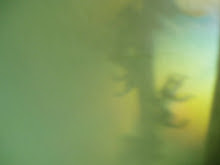So there is nothing in the middle of the bubble, but is there then no bubble? The interesting transition is that materialism (or utilitarianism, your term, which really is more to the point) is something that kills metaphysics and does not leave one with a more direct apprehension of objective reality, but utterly centerless drift ("Derive," if you're a Situationist consumer of urban jouissance). Noble savages and polymorphous vitalism on one hand, or antihierarchical autonomy for the destitute on the other, can function as something other than colonialist ideological pablam only with a real big Other. Culture being politics and politics being culture make all of our little passive choices an infantile (or perhaps adolescent) dimension of drama that becomes pathetically absurd upon even a moment's reflection. Sanity requires unity, which ethical pragmatism is not likely to yield. But maybe aesthetics can deliver that, again, someday, perhaps, somehow, maybe.
Sunday, October 11, 2009
This month the sermons at my church have been about the book of James, which is all about the materially disenfrachised- the poor, widows, orphans. I was pretty moved by my pastor saying that "faith looks like something"-- it has an exterior. In Eckhart's term, there is an inner world, in which miracles and grace resolve into love, redemption, etc.-- and the outer, created, world, the basis of being, which is not an illusion at all, but is broken and blighted by sin. You, like Zizek, are eschewing a "big Other"-- but you are more willing than he is to give absence a name, the status of an entity, which is actually what Eckhart does. He was considered somewhat heterodox in his lifetime, but he is now a mainstream mystic who refers to God as "nothing."
Subscribe to:
Posts (Atom)
